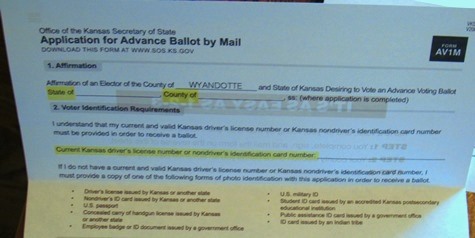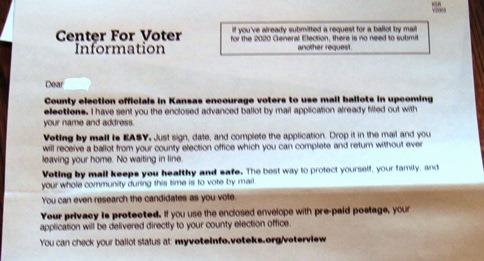


If an unsolicited mail ballot application arrives in the mail, should you use it?
A reader recently contacted the Wyandotte Daily to ask about a mail-in ballot application she received from a third party, not from the Wyandotte County Election Office.
The applications sent out this week are from a national organization that is trying to get out the vote for the November elections. This particular effort was targeted at getting women and minorities to vote in the upcoming elections, and one of the organizations related to this effort thinks increasing turnout among these groups will be the key to winning the fall elections.
For the general election, Wyandotte County will offer advance voting in person, advance voting by mail and Election Day voting in person.
Wyandotte County Election Commissioner Bruce Newby responded to our questions that the third-party ballot applications could be terribly confusing to some voters, especially those who are permanent advance voters and those who have already applied for a ballot by mail.
“This application form was sent by an organization that has no official connection to any election office in Kansas,” Newby wrote. “The Secretary of State is aware of this outside effort. The (Kansas) Secretary of State’s office approved the application form AV1 but does not have the authority to control the content of any accompanying letter or to whom these are sent.
“Voters can expect many such mailings from others in the coming weeks, including the political parties, major candidates and others,” Newby stated.
“This one comes from outside Kansas,” Newby wrote. “It is sent indiscriminately to all voters, including many who have already requested a mail ballot as well as permanent advance voters who will automatically receive a mail ballot. In some instances, other organizations have given voters the wrong county election office address.
“Some will ask voters to return their application to the organization on the premise that the organization will forward it to the correct election office,” he wrote. “Voters who send their application back to the sending organization need to be aware that the personal information they provide could be used by that organization for other purposes. Further, the voter has no guarantee that the Election Office will ever get their application.”
Newby had several recommendations for voters:
• Go online to print the Form AV1 on the Election Office website, www.wycovotes.org. Voters can fill it out online but must print and sign it before they mail, email, or FAX it to the Wyandotte County Election Office.
• Registered voter households will receive official mail from the Election Office mid-September that will include three copies of the official Form AV1.
• Send us only one application per voter. Please, do not send duplicate by-mail applications to us.
• Never send a completed application for a ballot by-mail anywhere other than the Election Office.
• Use forms sent by anyone other than your election office with caution. To whom are you providing your personal information? What are they using it for?
More about this mailing
The reader who contacted us received a mail ballot application form from the Center for Voting Information, Washington, D.C. The sender’s address on the mail was from Springfield, Missouri. The application form was already filled out with the voter’s name and address, but not with the signature or driver’s license number.
There was a letter also with the mail ballot application. The letter did not contain any references to political parties or candidates, and did not discuss any political positions.
Included with the application form and letter was a return envelope to the Wyandotte County Election Commissioner’s office and address, and with the voter’s name and address on the sender’s return address. It was a postage-paid envelope.
The Center for Voting Information, according to its website, is “a non-partisan and non-profit organization that works to provide even-handed and unbiased information about candidates and their positions on issues. We also provide voting-eligible citizens with tools and resources to register and vote in upcoming elections.”
The website stated that CVI and Voter Participation Center generated 939,000 registration applications for the 2020 election, and more than 2 million vote by mail applications for 2020.
According to the website, they also do polling and have seen a noticeable upsurge of support from minorities for the Joe Biden campaign after the announcement of Kamala Harris as the vice presidential nominee.
In a Federal Election Commission document, CVI stated it was formerly known as “Women’s Voices, Women’s Vote Action Fund,” and changed its name in 2017. The organization targeted women, millennials and minorities in an effort to raise wages and address economic and other issues, according to the website.
According to the Center for Responsive Politics, opensecrets.org, the Center for Voting Information has a political action committee.
CVI did not report any contributions this year, but it reported an independent expenditure of $38,481, according to the Center for Responsive Politics. Vendors and recipients included the Pivot Group and Grow Progress.
According to the Center for Responsive Politics, the $34,481 was an independent expenditure for support of the Joe Biden for President campaign – it was not by the Biden campaign itself. CVI had supported some other Democratic candidates in other areas in past years.
For more information on voting, visit www.wycovotes.org or call the Election Office at 913-573-8500 during office hours.
